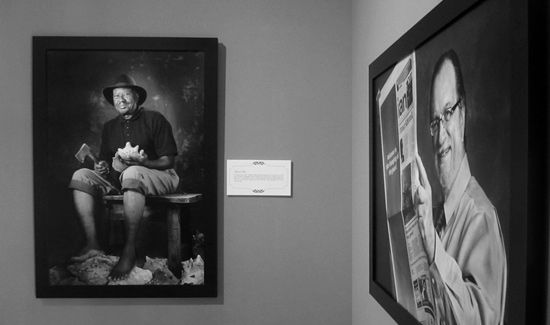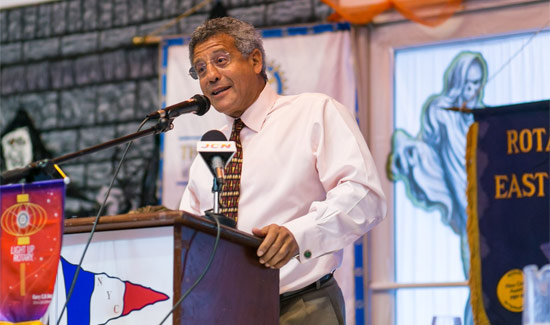One in three women will be raped, killed or beaten during her lifetime. That is the rallying cry of One Billion Rising, a global campaign reminding the global commons of the “worldwide epidemic of violence against women”.
For context, the campaign notes that of the world’s seven billion people, approximately half are women. Of these three and a half billion females, one billion or roughly a third of our mothers, daughters, sisters, friends and co-workers, will be the victim of physical violence, overwhelmingly perpetrated by men.
During the recent U.S. federal electoral cycle, the Democratic Party pressed the mantra of a “war on women” purportedly being waged by the Republican Party and various hard-right media and interest groups.
Following a speech by a young female law student Sandra Fluke relative of a national controversy on certain federal contraceptive mandates – with people of goodwill taking various positions – talk-show magnate Rush Limbaugh scorned Fluke as a “slut” and “prostitute” because of her views.
Over two days, Limbaugh savaged her with all manner of venom. After hemorrhaging significant sponsorships, he issued an apology, which Fluke rejected as “dubious and inadequate”.
Limbaugh modelled the behavior and rhetoric common to racists, homophobes, sexists and bigots of all stripes: Demonize the object of one’s contempt with code words and language employed to dehumanize them. This encyclopaedia of bigotry includes vitriol such as sissy, nigger, “Haitian” (pronounced high-tian) et al.
From first world to third, violence against the dignity and equality of women takes many forms, from sticks and stones to guns and machetes and fists and feet, as well as an arsenal of words used to wage war on the bodies, spirits and equality of women. In what many Americans like to call the most exceptional nation in history, women are still struggling for equal pay and benefits.
Depressing
To be certain, there continue to be significant and impressive advances in the struggle for women’s rights and equality. Yet, overwhelming numbers of stories and statistics blend to paint a depressing picture of the denial of the human rights and full dignity of women.
Mere weeks after the gang rape of a woman on a bus in Delhi, India last year, seven men allegedly gang raped a woman on a bus in the northern state of Punjab. The 29-year-old was travelling back to her village, according to an account published by the BBC.
“The driver and conductor allegedly refused to stop at her village, instead taking her to a desolate location not far from the city of Amritsar. The two men are then believed to have been joined by five others and (took) turns raping the woman throughout the night. The victim was then dropped off near her village, where she was able to tell her relatives about the attack.”
A lingering case in India is that of Aruna Shanbaug. In 1973, the Mumbai nurse was sodomized by a cleaner in the hospital where the 25-year-old woman worked. She was strangled with metal chairs, and was left to die, the BBC said.
“For the past 39 years she has been lying in a hospital bed in a vegetative state, brain dead, unable to recognize anyone, unable to speak, unable to perform even the most basic of tasks.”
The rapist was not charged for raping her. Instead he was given the light sentence of seven years for robbery and attempted murder. Her attacker, long ago freed, changed his name and works in a Delhi hospital.
A rape is reported every 21 minutes in India. Last year, a 14-year-old was raped and killed in Uttar Pradesh – inside a police station. There are ongoing reports of physical and verbal abuse meted out to women who go to police stations to report rape. And, there are numerous reports of women raped by the police.
Notable
A notable case occurred in 1972 when a 16-year-old girl, was raped inside a police station by two policemen. The courts set the men free on the grounds that: “She did not raise an alarm, she was not injured, and since she was sexually active, she would have ‘voluntarily’ consented to sex.”
Following heated protests, an anti-rape law was passed in 1983, “to accommodate the provision that if a victim says that she did not consent to sex, the court will believe her”.
There is another story, of a woman in custody in Chhattisgarh, arrested on charges of being a courier for a Maoist group. She alleged that she was raped while in custody, and that police stuffed stones inside her vagina.
In India rapists sometimes escape with light sentences because judges accept “their argument that they committed the crime because they were drunk, or that they were living away from their family, or they had a family to look after, or that the accused was a high-caste man who could not rape a Dalit – low caste – woman”.
Shockingly, in the last five years, various Indian political parties fielded for state elections “27 candidates who declared they had been charged with rape”. There are “six elected state legislators who have charges of rape against them”.
A study found that Indian women “died more from ‘injuries’ in a given year than while giving birth”, and there is a high rate of female foetuses aborted and baby girls killed after birth.
The epidemic of violence against women is worse in various countries such as India. Yet the causes of such violence are rooted in entrenched patriarchy and misogyny, and often rooted in certain fundamentalist religious mindsets.
Last Christmas a European cleric posted a sexist note on the door of his church blaming women for the domestic violence they had to endure, a variation of the twisted theme that women invite violence against them: “How often do we see girls and mature women going around scantily dressed and in provocative clothes? They provoke the worst instincts, which end in violence or sexual abuse. They should search their consciences and ask: did we bring this on ourselves?”
Misogyny and sexism are often bolstered by certain religious instincts, church structures and time-bound man-made rules masquerading as God’s eternal will. While women are equal and free to advance in most areas of life, including heading governments, they are locked out of pastorates and presbyterates, pulpits and policy-making in church polities.
Continuum
While we are by no means like India, there is a continuum of sexism and misogyny which believes that Bahamian women should not be fully equal to men constitutionally in terms of passing on a certain right of citizenship.
That certain women, including notable politicians who purport to be champions of women’s rights, argued process in denying full equality for women, is akin to those who argued to slaves, we’ll give you full rights in due time and process. Exactly how long must poor black Kate wait?
And how much longer must Bahamian woman wait before the passage of marital rape legislation? Perhaps it will only come after a brutal marital rape that becomes a cause celebre, such as the gang-rape case in India.
A similar mindset fuelling the epidemic of violence against women in India is resident here at home in the feudal mindsets of male bigots and not a few women trapped in a fundamentalist worldview and time warp.
As people across the world rise to protect the women of the world, so too more Bahamians should rise to secure full constitutional equality for women and to put a lie to the misogyny and sexism that claims that a woman cannot be raped by her husband.
In years to come, future generations will look in shame and some scorn at how long it is taking us to advance the human dignity, rights, equality and protection of one half of our fellow citizens.
By: Simon
Source: Front Porch column in The Nassau Guardian



